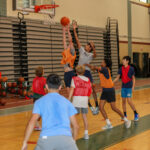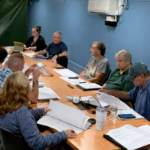The School Committee on Thursday — in addition to settling on a name for the new elementary school — authorized Vertex to take cost-cutting measures totaling $1,081,000 for the Hopkins addition/renovation project, bringing the current ask to $48,550,000.
Jeff D’Amico, project director from Vertex, said that figure was subject to further reduction once the firm reconciles the work of two estimators in the middle of April. He said the board would get a presentation on the final total on April 25, prior to a public forum on April 30.
Ultimately, the proposal will be put to a vote at Town Meeting in May.
“I appreciate going in and really sharpening pencils and having taxpayers in mind,” chair Nancy Cavanaugh said, “even though they are nice-to-have things.”
“It’s part of the process,” D’Amico responded. “Whenever the number ticks up, we’ve got to make sure to get it back down.”
Assistant Superintendent of Finance and Operations Susan Rothermich noted that Town Meeting warrant motions are being printed on April 10, so that $48.5 million figure will appear. However, she said it could be adjusted from the Town Meeting floor.
Among the items reduced were changing the operable gym divider from a partition to a curtain ($332,000), reducing the number of wells in the geothermal field ($156,000), eliminating the under-drain system and the shade structure at the field ($149,000 and $122,000, respectively) and eliminating the specialty surface at the outdoor basketball court ($49,000).
School Committee members asked about the removal of piping for an under-drain system, which was an added level of protection. D’Amico said its absence would mean the field would dry up more slowly. He said a level of crushed stone layer was kept in, and it is an item that could be revisited at the end of the project if funds are available.
“It is an element we could put back and do as we are on our way out the door,” D’Amico said.
Committee members also questioned the gym partition change, but Superintendent Carol Cavanaugh said the attached multipurpose room would be a quieter place for children with sensory issues.
D’Amico noted the curtain divider is more commonly used in school districts around the state.
The School Committee also agreed with Vertex’s recommendation to hire WSP as a mechanical, electrical and plumbing commissioning consultant. The approval of $10,241 is only for the design phase, D’Amico said, and it will be taken from last year’s $3 million Town Meeting allocation.
School climate surveys reviewed
In her superintendent’s report, Carol Cavanaugh reviewed some of the findings of a survey given to students, faculty/staff and parents to gauge their thoughts on the school climate.
Among highlights of the 1,745 responses: 87.6% of students in Grades 6-12 agreed or strongly agreed that school rules are fair and consistent, and 82% felt consequences for breaking rules are fair and equitable.
But only 60.6% of faculty and teachers agreed or strongly agreed about the consequences question. Also, that group felt that 67.9% of kids exceeded behavioral expectations.
Carol Cavanaugh talked about how suspensions are reserved now only for students who may harm themselves or others, otherwise “restorative practices” are instituted, per the state.
As a result, the superintendent said educators are seeing more disrespect from students, especially post-COVID. She said the problems are not “deplorable actions” but “little things that feel like a million bee stings. … When you have it 15 times per day, you start to feel it,” the superintendent said.
Committee members expressed concern for teachers and asked what backing could be given to address the problem.
Carol Cavanaugh said the state legislators are acting to stop suspensions entirely. Losing the ability to suspend in extreme instances for safety will be “challenging,” she said.
Member Lori Nickerson questioned how custodial and kitchen staff feel about treatment by students. The superintendent said they did not send in responses despite being given the opportunity.
“It’s heartbreaking they don’t know we think their voice is important,” Carol Cavanaugh said.
“They are the unsung heroes of the building. They see students at their worst,” Nickerson said, adding kids may treat teachers better because “they will impact their futures.”
Student representative Jack Ianelli said he has never seen students leave the lunch line without saying thank you to the cafeteria workers. In general, he sees a positive relationship because “kids are happier at lunch.”
He noted students have less direct contact with custodians, and disrespect may occur by leaving messes around, not thinking “they are making custodians’ lives harder.”
Member Susan Stephenson recommended administrators sit down with these groups and discuss how they are being treated and “get a read on what they are feeling.”
Other results showed 66.2% of faculty and staff feeling trusted by central office administrators. Feedback was that this population did not feel included in changes to curriculum and they wanted to see administrators in their buildings more often.
Carol Cavanaugh said she and Assistant Superintendent Jeff LaBroad tried to be in each building at least once per week, but she would make time to do more.
The overall climate was deemed positive by 90.8% of faculty and staff and 92.9% of students. Also, 94.8% of families feel welcomed at the schools.
Attendance policy to be discussed
At a future meeting, the board will talk about the attendance policy in the wake of COVID exceptions getting eliminated as excused absences.
During the public comment section, parent Ashley Fogg asked that the attendance policy be updated. Two of her three young children exceeded the “unexcused absences” rule, permitting no more than seven absences in a six-month period. (She asked why exceptions were made for COVID and not other sicknesses prior to the superintendent talking about the change to COVID restrictions.)
Fogg questioned sending sick kids into school with flu, fever, vomiting, strep throat and other respiratory illnesses. She questioned why children staying home for legitimate illnesses and with doctors’ notes are considered unexcused absences.
Carol Cavanaugh explained the process is for assistant principals to send notes home to parents when there are more than seven unexcused absences, and she acknowledged it is upsetting for some families.
Nickerson asked the topic be put on a future agenda. She asked to clarify whether it is each district instituting the rules or the result of state regulations.






















0 Comments